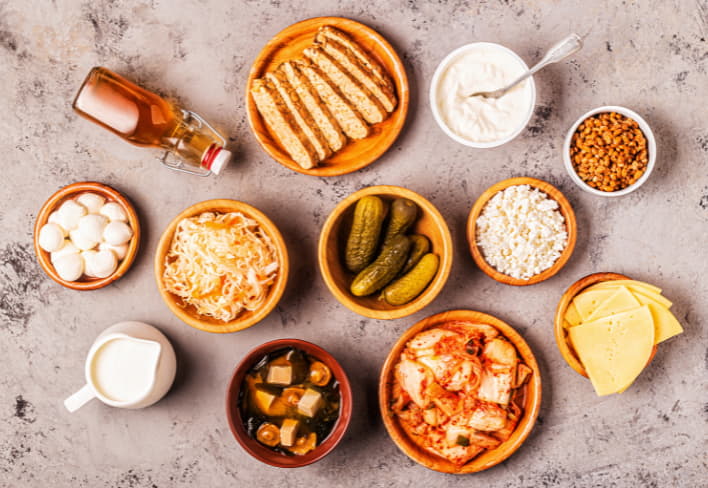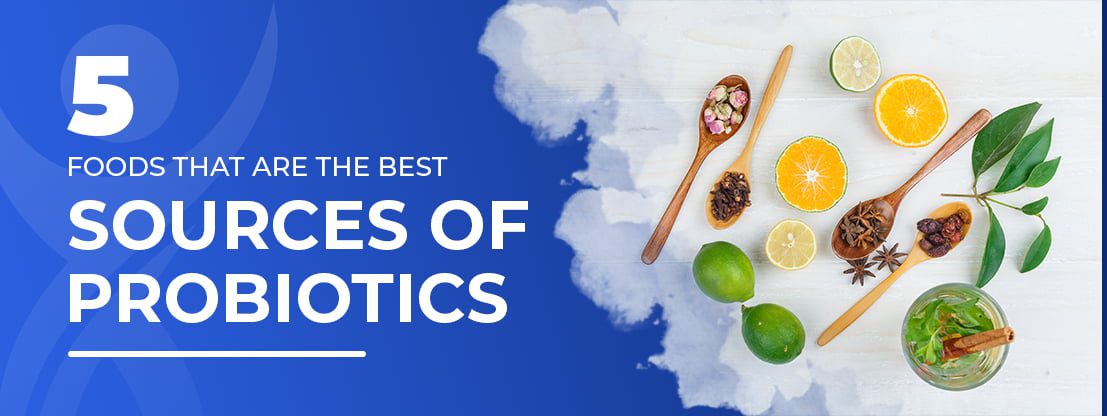What are Probiotics?
Probiotics are living microbes that when consumed can provide us with health benefits. They are usually bacteria that serve as good bacteria food, but there are certain types of yeasts also that function as probiotics and can improve the diversity of the gut microbiome.
What is the gut microbiome?
The term “gut” refers to the gastrointestinal tract, especially the small and large intestine. The gut breaks down food into smaller particles and absorbs nutrients from food. It houses trillions of microorganisms including bacteria, viruses and fungi. Most of them are in a pocket of the large intestine called the cecum and together they form a complex ecosystem known as the gut microbiome.
The importance of balance and diversity in the gut microbiome
Generally, the more diverse your gut bacteria, the healthier you are. The balance of microbes in the gut microbiome is closely connected to the health of other major organs and systems in the body. There are essentially three types of bacteria in the gut – beneficial bacteria, harmful bacteria and opportunistic bacteria.
While beneficial bacteria boost immunity and aid digestion, harmful bacteria can trigger disease and cause ageing. Opportunistic bacteria cause no harm when the gut is in a healthy state but can cause harm when the delicate balance between good and bad bacteria is disturbed.
The ratio between good and bad bacteria should be about 85:15. When this balance is disturbed, it is called dysbiosis and in the long term, such imbalance can trigger chronic inflammation and serious diseases like diabetes, bowel cancer and heart issues. It is thus vital to make your gut microbiome as diverse as possible and to restore balance if there is a state of dysbiosis.
Digestive issues like heartburn, bloating and constipation can be a pointer to poor gut health. However, the best way to get an accurate idea about your gut health is to take a test like the Bione Gut Microbiome test. A simple, at-home test that takes only 10 minutes, the test report provides you with a clear overview of the microbes in your gut. You will get precise guidelines on what changes you need to make in order to improve your gut health and thus your overall health. This is where probiotic bacteria come in as they can contribute significantly to restoring a state of balance in the gut.
The benefits of taking probiotics
- Probiotics promote digestive health: Probiotic foods help to process fibre which is normally indigestible and expedite the absorption of nutrients from food. They aid in the elimination of wastes and toxins from the colon.
- Probiotics can help with depression and anxiety: There is a close connection between gut health and brain health. This link between the gut and the central nervous system comprising the brain and the spinal cord is known as the gut-brain axis. Scientists believe that probiotics reduce inflammation in the body. This has an impact on the production of neurotransmitters leading to better sleep, mood and cognitive function. The mind becomes clearer and stress has less effect.
- Probiotics can promote immunity: The gut is responsible for 80% of your immunity. A strong gut means better immunity. Probiotics serve as immune boosting foods by reducing your count of bad bacteria, increasing your count of good bacteria and reducing inflammation which can trigger many serious diseases.
- Probiotics can reduce the incidence of “leaky gut syndrome”: Leaky gut occurs when the intestinal walls become permeable and toxins and undigested food leak into the bloodstream. This triggers autoimmune issues like ulcerative colitis and eczema. Probiotic foods strengthen the intestinal barrier and can help you recover gut health.
- Probiotics can help you get better results from your workout routine: According to studies, using probiotic supplements can help reduce inflammation, improve endurance, boost stamina, lower incidence of GI symptoms and help recover from oxidative damage.
- Probiotics can help you lose weight and your belly fat: Studies have found that probiotics, specifically strains of the lactobacillus family, can help people to lower their body fat percentage and lose weight. By helping to make the gut bacteria more diverse, probiotics can help you rev up your metabolism and maintain a healthy weight.
Increasing relevance of probiotics today
Research has shown that the gut microbiome of people today is less diverse than it used to be many years ago. This is due to many factors like increase in use of antibiotics, wider use of processed foods, higher prevalence of a sedentary lifestyle, more stress related to the modern lifestyle, environmental toxins and even excessive hygiene. Less diversity in gut health means poorer gut health and this is why the use of probiotics has become more relevant today.
Supplements or probiotic rich foods?
Probiotics can be sourced from both probiotic foods and from supplements. Each option has its own advantages and disadvantages. What works for you might not work for another person and the best option can differ based on individual lifestyle factors.
Taking probiotic supplements gives you greater control over delivery of particular bacterial strains that might be needed for a specific health issue. For example, lactobacillus rhamnosus GG is best for supporting the recovery of the gut from diarrhoea due to the use of antibiotics. A variant of lactobacillus acidophilus can help reduce the effects of lactose intolerance. Another advantage is that a supplement may have more strains of microbes while a food might have only one or two strains. Many probiotic foods are soy or lactose based and this can trigger food sensitivities or allergies while supplements are generally free of common allergens.
Whole foods having probiotics offer the advantage that they are a better source of overall nutrition. They do not contain just probiotics but are also rich in micro vitamins, minerals and fibre that are essential for the body to function. Many sources of fibre derived from plants act as “prebiotics” which are the foods that probiotics feed on to thrive in the gut.
Five best sources of probiotics:

- Yoghurt: Yoghurt is one of the richest sources of probiotics. It is made from milk through fermentation with the aid of beneficial bacteria like bifidobacteria and lactic acid bacteria. Yoghurt offers many health benefits including better bone health, regulation of high blood pressure levels and relief of symptoms linked to irritable bowel syndrome. It can help children to recover from diarrhoea caused due to use of antibiotics. When consuming yoghurt, it would be wise to ensure that the yoghurt has not been pasteurised as that kills all live bacteria. Yoghurt should not also have any added sugar or flavours as that offsets the benefit of consuming yoghurt in the first place. Yoghurt can be taken even by those with lactose intolerance as the lactose in the milk is turned into lactic acid due to the action of the bacteria.
- Traditional buttermilk: Traditional buttermilk refers to the liquid that is left over after making butter from milk. The buttermilk should be the traditional version and not the cultured variant. Cultured buttermilk does not have live bacteria. In order to get the probiotic benefits, the bacteria should be alive at the time of consumption. Buttermilk is low in fat but has several vital minerals and nutrients like calcium, phosphorus, riboflavin and vitamin B12.
- Pickled cucumbers: Cucumbers that have been pickled in brine, a solution of salt and water are a rich source of probiotics. They become sour when they are fermented in this solution for some time due to the action of the lactic acid in them. Pickled cucumbers are not only a great source of probiotics but they are also a good source of vitamin K and are low in calories. It is important to note that the use of vinegar for pickling kills live bacteria. Such pickles do not contain live probiotics.
- Kimchi: Kimchi is a spicy, fermented Korean dish made mainly from cabbage. It can also include other vegetables like radish, carrots and can even include seafood like prawns. It is spicy thanks to the use of seasonings like ginger, garlic, red chilli pepper flakes and scallion. Kimchi contains lactic acid bacteria like Lactobacillus kimchi and other lactic acid bacteria. It is high in vitamins and minerals like iron, vitamin K and riboflavin.
- Sauerkraut: Sauerkraut is also a fermented cabbage dish that is quite popular in Germany, Russia and eastern Europe. It is made by mixing fresh, finely shredded cabbage with salt and pressing down the mixture. This releases water and causes fermentation. It is sour, salty and can be stored for many months. Sauerkraut contains a lot more lactobacillus than yoghurt. It is a fibre rich food that has high amounts of iron, manganese and the vitamins C,B and K. It also can contribute to eye health as it is rich in antioxidants like zeaxanthin and lutein. Life today has become much more complex and hectic than it used to be and sadly, this has had an impact on what we choose to eat as well. The end result is that our gut microbiome is less diverse and we are more prone to diseases. Bione offers wellness solutions that present a new trend – precision nutrition based on your genetic profile and your gut health. Based on the results of the Bione tests, our experts can advise you on a customised diet that can take you places on your wellness journey.



